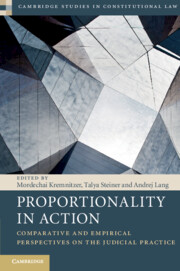Book contents
- Proportionality in Action
- Cambridge Studies in Constitutional Law
- Proportionality in Action
- Copyright page
- Contents
- Figures
- Tables
- Contributors
- Preface
- Cases
- Introduction
- 1 Proportionality Analysis by the German Federal Constitutional Court
- 2 Proportionality Analysis by the Canadian Supreme Court
- 3 Proportionality Analysis by the South African Constitutional Court
- 4 Proportionality Analysis by the Israeli Supreme Court
- 5 Proportionality Analysis by the Polish Constitutional Tribunal
- 6 Limitation Analysis by the Indian Supreme Court
- 7 Comparative and Empirical Insights into Judicial Practice
- Index
7 - Comparative and Empirical Insights into Judicial Practice
Towards an Integrative Model of Proportionality
Published online by Cambridge University Press: 14 April 2020
- Proportionality in Action
- Cambridge Studies in Constitutional Law
- Proportionality in Action
- Copyright page
- Contents
- Figures
- Tables
- Contributors
- Preface
- Cases
- Introduction
- 1 Proportionality Analysis by the German Federal Constitutional Court
- 2 Proportionality Analysis by the Canadian Supreme Court
- 3 Proportionality Analysis by the South African Constitutional Court
- 4 Proportionality Analysis by the Israeli Supreme Court
- 5 Proportionality Analysis by the Polish Constitutional Tribunal
- 6 Limitation Analysis by the Indian Supreme Court
- 7 Comparative and Empirical Insights into Judicial Practice
- Index
Summary
The chapter presents a comparative analysis of the application of proportionality in the six jurisdictions analysed in the book: Germany, Canada, South Africa, Israel, Poland, and India. The analysis focuses on the relationship and division of labour between proportionality's subtests and the function of the multi-stage doctrine as a whole. Examining two central attributes of the proportionality doctrine in the theoretical literature – the sequential structure of the analysis and the conception of a single dominant element – the chapter demonstrates how several of the analysed courts deviate from a strictly sequential model and present a tendency towards an integrated approach to proportionality. Descriptively, some potential causes for the gravitation of courts towards an integrative model of proportionality are offered. Normatively, the argument is made that an integrative use of proportionality analysis is also desirable: recognizing the connections between the stages and allowing feedback between them fully exploits the analytical potential inherent in proportionality analysis. This type of proportionality analysis best reflects the role of the court in ensuring that rights are limited only when justified, and provides the most positive guidance to policy-makers.
Keywords
- Type
- Chapter
- Information
- Proportionality in ActionComparative and Empirical Perspectives on the Judicial Practice, pp. 542 - 611Publisher: Cambridge University PressPrint publication year: 2020



